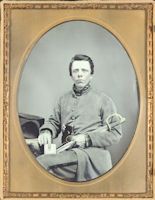Before Vicksburg, Tuesday, June 2. Fired at intervals all day. At night fired thirty minutes without ceasing. Caisson limber after ammunition in the evening. Up till midnight helping on the bastion. The heat very oppressive.
Sunday, June 2, 2013
June 2, 1863.—Before Port Hudson, within easy cannon-range. This morning, we are not marching or fighting. We lie encamped in a wood, at the edge of a clearing, across which the rebel works are in plain sight, at the distance of a few hundred yards. The boys, who venture only a few rods from here to the edge of the clearing, find the shots of the rebel sharpshooters falling about them: their shells frequently strike in and about our camp. A piece of one has fallen within a few yards of me, breaking three muskets out of a stack that stood in the line. Day and night, our batteries are firing. Every few minutes, and at times more frequently, the earth-shaking roar of pieces of very large caliber makes the whole region tremble. Hardiker and I have built a little booth of boughs, whose roof may be taken off at any moment by a rebel missile. Two or three times last night, the earth flew to the right and left of the dead tree-trunk at whose foot we were resting.
July 2. Commences with pleasant but very warm weather; at nine A. M., inspected crew at quarters; from eleven A. M., until three P. M. firing of heavy guns heard in the rear of Port Hudson; the rebel water batteries firing at lower fleet.
June 2d. Early this morning vessels of lower fleet fired a few shots; later, during this forenoon, sent seven rebel prisoners ashore to be taken across the point of land opposite Port Hudson to lower fleet; at nine o’clock heavy firing in rear of Port Hudson by our army; during the evening the upper batteries at Port Hudson opened fire inland.
June 2 — All appears tolerably quiet this morning — occasionally a cannon can be heard. Lieut. Hopkins started home tonight. Moon is now shining bright and the Yankees are shelling town at 11 o’clock p.m.
June 2.—The circulation of the newspapers, Chicago Times and New-York World, was prohibited, in the Department of the Ohio, by a general order from Major-General Burnside, their “repeated expressions of disloyal and incendiary sentiments” being “calculated to exert a pernicious and treasonable influence.”—At Nashville, Tenn., C. F. Jones was arrested for writing treasonable correspondence to the Freeman’s Journal of New-York.—F. H. Pierpont, Governor of Virginia, issued a proclamation, calling upon the commandants of the State militia to hold their regiments in readiness for the field at an hour’s warning, as “the enemies of their liberty and prosperity were again threatening their homes.” — The- Twenty-fourth regiment of New-York volunteers returned to Oswego.—The city government of Portsmouth, Va., was organized. —West-point, Va., was evacuated by the Union troops.—The ship Amazonian was captured in latitude 11° 15′, longitude 34° 30′, by the rebel privateer, Alabama.
by John Beauchamp Jones
JUNE 2D.—We have a dispatch from Mississippi, stating that on Thursday last Grant demanded the surrender of Vicksburg in three days. He was answered that fifteen minutes were not asked; that the men were ready to die—but would never surrender. This was followed by another assault, in which the enemy lost great numbers, and were repulsed—as they have been in every subsequent attempt to take the town.
A letter from our agent in London says H. O. Brewer, of Mobile, advanced £10,000 in March last, to buy a steamer for the use of the Confederate States.
Gen. Whiting writes from Wilmington, that a captured mail furnishes the intelligence that the enemy have thirty-one regiments at Newbern, and he apprehends they will cut the railroad at Goldsborough, as we have but two small brigades to resist them. Then they may march against Wilmington, where he has not now sufficient forces to man his batteries. The general says he is quite sure that individual blockade-runners inform the enemy of our defenseless points, and inflict incalculable injury. He desires the Secretary to lay his letter before the President.
A circular from the Bureau of Conscription to the commandants of conscripts says, the Assistant Secretary of War (Judge Campbell) suggests that overseers and managers on farms be disturbed as little as possible just at this time, for the benefit of the crops. But what good will the crops do, if we be subjugated in the mean time? I thought every man was needed, just at this time, on the field of battle.
The President rides out (on horse) every afternoon, and sits as straight as an English king could do four centuries ago.
Tuesday, 2d.—3:30 A. M., ordered back to our brigade. Lying in reserve behind 57th Georgia. 3 P. M., ordered into ditches between 39th and 56th Georgia regiments; very dangerous place, as can be raked by artillery.








